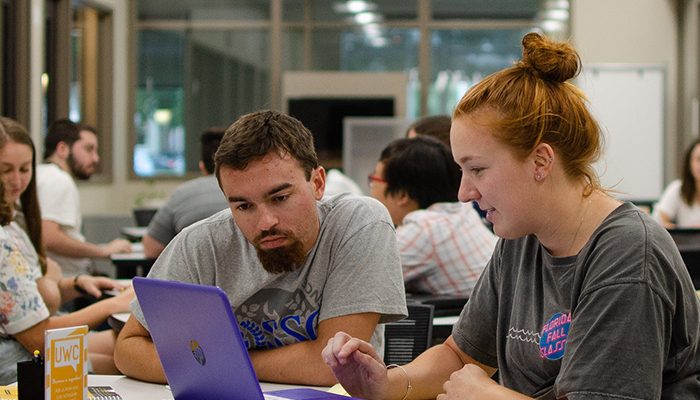by Rachel Stillword
Growing up, I went to schools where the diversity of the student population started and ended with which hospital you were born in. Most were raised locally and had parents and grandparents who grew up and worked in the area for their entire lives. My siblings and I were part of a minority; however, our parents did not grow up in the same place.
My father was born and spent much of his younger years in a small Romanian town, while my mother was raised in a small town in Virginia. Through life circumstances—some fortunate, others not so much—they made their way to the same small, close-knit community. While different backgrounds and perspectives weren’t frowned upon there, they were also not spoken of outright. As a member of the only Jewish family in the entire town, I remember times when I was treated as an obstacle or an artifact during my classes. Teachers failed to recognize the diversity of my identity, and there was even an instance where one of my history teachers played an antisemitic video for my older sibling’s class. The video was so bad that my brother and sister had to walk out of the room and contact the principal of the school. The teacher almost got fired; however, due to the lack of available substitutes, he was allowed to stay. From then on, I was asked if I was going to be a “good Stillword.” Was I going to be the person who got a teacher fired because my background was an obstacle in the way of his laziness?
Now, with my job as a peer tutor, I see writers from all around the globe who want to share their perspectives and skills. Cultural differences once seen as “obstacles” or “artifacts” are now coveted perspectives. With UCF’s student population, which is over three times the size of the town in which I grew up, I now have the opportunity to learn from many different people. Observing my peers during their sessions, for example, has given me insight into why they write what they do and how they construct meaning. Hearing responses from students like, “it doesn’t flow right,” and “I don’t know how to get what I want to say on a piece of paper,” have also been common sentiments. Depending on background or context, those sentiments can mean very different things. For some, it is because they seek a better command of sentence structure. For others, it is because their native language isn’t English.
While listening to a writer’s needs and paying attention to their diverse background isn’t a new concept to me, my experience as a tutor has been one of the first times that I’ve had to acknowledge it and put it into practice. One of the most memorable sessions that I’ve had with a writer showed me the importance of listening. The student was a returning writer asking for help with crafting a personal statement for her master’s degree in psychology. Though she frequently stated that she wanted to condense her sentences, it was also important for her to include a comprehensive discussion about the thoughts she had on her past experiences. She delved into her past on a movie set and as part of a cooking group. She talked about her time traveling across the country and raising multiple children. She wrote about her difficulties working in public education. We discussed her Filipino history, culture, and daily challenges. We still worked toward her original goal of making her sentences more concise, but listening to her discuss her experiences in depth allowed us the time and space needed to enrich her paper. Furthermore, it also enriched my perspective on how to conduct a productive session as a tutor.
Listening to writers about their concerns while understanding that writing is a chaotic practice helps reinforce the idea that we are working for the betterment of each other’s lives. Actively listening to others teaches us to embrace the complexity of every individual. Reading the personal statement that someone has been agonizing over for months, and then having our final session where I can tell them that I think it’s good enough for submission—seeing that bright smile light up their face, and the excitement of finally being done—is such a rewarding experience. We can emphasize a diverse background and highlight its beauty, rather than limiting it through a generalized lens. This has been the most important aspect of my time as a writing tutor. My experiences living in a small town made me believe my unique family history was strange or a thing to be ridiculed, but working alongside people just as diverse as me helped me realize it is anything but. While my writer is excited to be working on their paper, I am excited to be hearing a new perspective.
Working with those who come from different backgrounds and listening to their struggles allows you to imagine yourself in their shoes and understand their experiences.
The reason why listening is so effective is empathy. Working with those who come from different backgrounds and listening to their struggles allows you to imagine yourself in their shoes and understand their experiences. To me, the combination of empathy and listening creates the ultimate form of collaboration. Though my writers and I may be collaborating physically by working on important documents meant for the betterment of their future, we are also collaborating in conversations that force us to think about our experiences and our situations. Conversing with others on topics that are emotionally taxing is a difficult experience. However, through that experience, I have learned a great deal by achieving an understanding of another’s thoughts and outcomes.
For students writing personal statements, empathizing and listening allows me to put names on the emotions that they are experiencing. Though I have never been in the writers’ situations, nor have I faced their struggles, I can still imagine what they were like. Working with a student who had a very emotional volunteering experience at a health clinic put this form of diverse collaboration into practice. What is it like working with young children who are close to the end of their lives? What is it like portraying those children’s stories and discussing their best days? What is it like to be confronted by a parent who is so thankful that you were there for their young child? We discussed all the charged emotions this student felt at the time. Separating that unique individual experience from herself and wading through a discussion on the impact of this experience on her identity as a healthcare provider caused us to think about why she was even writing about it in the first place. Why this sort of interaction was even placed into her personal statement led to a deeper analysis of her lived experiences. This collaboration was only possible with another voice coming from a different perspective and background working to understand her struggles and thoughts. And while she was focusing on the development of her essay, I was thinking about the fragility of human life, and how much people are impacted by simple acts of kindness from another human.
By pursuing empathy and listening, I aim to develop long-lasting relationships with those who come into the writing center. With these relationships, we can create a community where everyone can collaborate, and where their troubles and experiences are validated. It is a space where everyone can discuss topics collaboratively. At its core, the writing center is for collaborative conversation and the betterment of knowledge. Even though I came from a background where diversity was frowned upon, it’s amazing to be part of a community where diverse backgrounds can be used to create collaboration.




